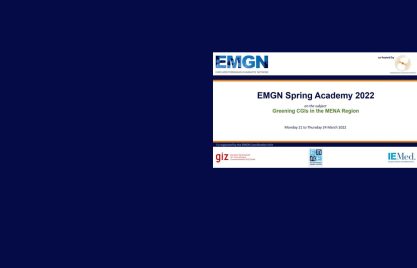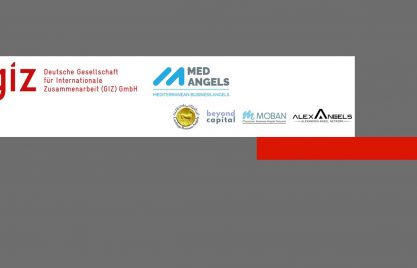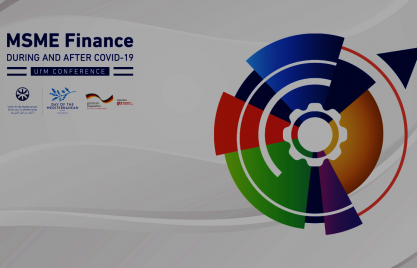Interview with Maha Bahou, Executive Manager of the Payments Systems, Banking Operations & Financial Inclusion Division at the Central Bank of Jordan
The Central Bank of the Hashemite Kingdom of Jordan has launched a multi-stakeholder policy process for the development and implementation of a national financial inclusion strategy. It has co-hosted regional policy forums on financial inclusion and employment in 2015 as well as on financial inclusion of women in 2016 to move forward the national and international knowledge exchange.
The Central Bank of Jordan (CBJ) is becoming the financial inclusion champion at both the national and regional levels. What are the CBJ’s main efforts to ensure a more inclusive financial system in Jordan?
The Government of Jordan has been committed to financial inclusion and several entities (national and international) have been working together over the years on developing an inclusive financial ecosystem in Jordan. Starting 2013, the Central Bank of Jordan has taken the lead and has been focusing on building a robust regulatory framework and digital financial in order to achieve financial inclusion for all Jordanians.
In 2016, the CBJ has announced its vision for a National Financial Inclusion Strategy to be launched for the period 2018-2020. The vision calls for increased financial education, client protection, and electronic payments targeting women, refugees and youth as well as small and medium-sized enterprises (SMEs). In order to implement the Strategy, the CBJ works and coordinates with different stakeholders: private, public, and civil society; and has formed working groups around the six pillars of the Strategy with a Steering Committee and a Technical Committee to oversee and guide its implementation.
We are moving from being a traditional Central Bank to a comprehensive regulator, and we are building the capacity of our staff in the process. With the assistance of international development partners such the World Bank, the EU and GIZ, and more recently by joining the Alliance for Financial Inclusion (AFI), the CBJ is getting exposed to experiences from around the world and is brought up to speed with the evolving financial inclusion landscape.
The CBJ has recently committed specific targets under the Maya Declaration. What are those targets and how are you planning to achieve them?
We have committed nine specific targets at the 2016 AFI Global Policy Forum as follows:
- Finalize the draft of The National Financial Inclusion Strategy by the end of 2017
- Formulate comprehensive digital financial services (DFS) and MFIs financial consumer protection guidelines by 1st quarter of 2017
- Continue to champion the financial education program into the existing Jordanian school curriculum (7th to 12th grades) by 2020
- Enhancing interoperability among the payments systems in the Kingdom by end of 2018
- Ensure efficient and responsible growth of the microfinance sector as part of the formal financial system
- Ensure an enabling legislative and regulatory environment for digital financial services is in place
- Provide the refugees and non-nationals with access to digital financial services
- Upgrade financial inclusion data collection and measurement to align with AFI’s network to produce comparable indicators by 2018
- Increase the financial inclusion access of Jordan’s youth (15-22 years) by 25,000 annually by 2020
We have already started the work on all of the above targets. We have recently launched the financial education curriculum in around 3,400 schools and more schools are in the pipeline. The objective is to create a financially savvy generation across the country. The CBJ has also launched various awareness campaigns on radio, TV, and social media about JoMoPay (abbreviation for the national switch Jordan Mobile Payment that allows interoperability between mobile money services) to reach different segments of society in addition to one-to-one orientation programs by the financial service providers (FSPs).
We are also working on launching several mobile wallets in partnership with telecom operators and FSPs with a special focus on youth and women. One example is the launch of the “Mahfazati” (my wallet in Arabic) mobile wallet solution by Al Hulool Consortium formed by the mobile operator Umniah and the Emerging Markets Payments Group (EMP) in partnership with five banks and one MFI, Microfund for Women (MFW). MFW has adopted the solution to its clients needs and has recently launched the service.
Social norms that restrict women’s mobility and access are among the many challenges Arab women face to start their businesses. Do you think digital financial services could help women gain more access?
Social and cultural barriers are the most prevalent in our region. We need to start early in schools to create awareness and to change behavior and norms among both males and females. It is also important to encourage women to become agents for financial and non-financial services.
We are tapping into the local community networks in order to reach the female community leaders and train them to become agents for financial and non-financial services. Female agents are able to easily communicate with their peers and show them how to open accounts, help them better understand contracts and pricing, and how to conduct cash in/out operations; we believe that this approach would break many barriers.
We are also creating special delivery channels by encouraging banks and post offices to offer basic savings accounts for women. We are working with some women advocates for handling consumer complaints and customer services according to each geographic region. The launch of the special money wallet and the loan guarantee program for women in cooperation with MFW would further ensure tailored services and delivery channels.
So, we are working on several initiatives at the same time, testing and tweaking in order to overcome the different types of barriers hindering the financial inclusion of women in all regions of Jordan.
The CBJ is working on financially including refugees and migrant workers. What are the Bank’s main efforts in that regard and what are some of the key challenges?
We are the first country to make a Maya commitment for the financial inclusion of refugees. According to the latest UNHCR report, Jordan hosts the second highest number (87) of refugees per 1,000 inhabitants in the world – 655,314 Syrians and 60,647 Iraqis registered with UNHCR in Jordan as of December 2016. A big percentage of those refugees (up to 93% of Syrian refugees) are living outside of camps and below the poverty line in Jordan. We therefore believe that mobile money can help to increase the financial inclusion of refugees as well as access to other basic services such as education and healthcare.
Jordan is the first country to use the Iris scan technology to enable refugees to access cash grants. By cashing it all out, they are not able to save so we need to think beyond cash assistance. Moreover, refugees are creating their own economy within camps and they definitely need more financial services. We are working on developing tailored financial services for refugees in partnership with FSPs and in particular MFIs while in the meantime collaborating closely with the UN and the Ministry of Interior in order to ensure that the key prudential requirements are met.
What do policymakers need in order to be able to draft more gender-inclusive financial policies?
Policymakers need to work on human-centric financial policies that take into account the needs of the various unbanked segments in their respective countries, only then financial inclusion for all will be achieved. I believe that the sky is the limit for what policymakers can do as long as they believe, they understand, they learn, and they take the initiative to bring about the necessary regulatory and infrastructure changes for an inclusive financial ecosystem.
This interview is brought to you by GIZ and the Arabic Microfinance Gateway under their Outreach Partnership for the Regional Policy Forum on Advancing Women’s Financial Inclusion in the Arab World. The event was hosted by the Central Bank of Jordan, the Arab Monetary Fund, and GIZ from November 22-23, 2016 at the Dead Sea, Jordan with the support of AFI, the European Union, CGAP, and New Faces New Voices.
Photograph (c) GIZ / Da’na Hussam



